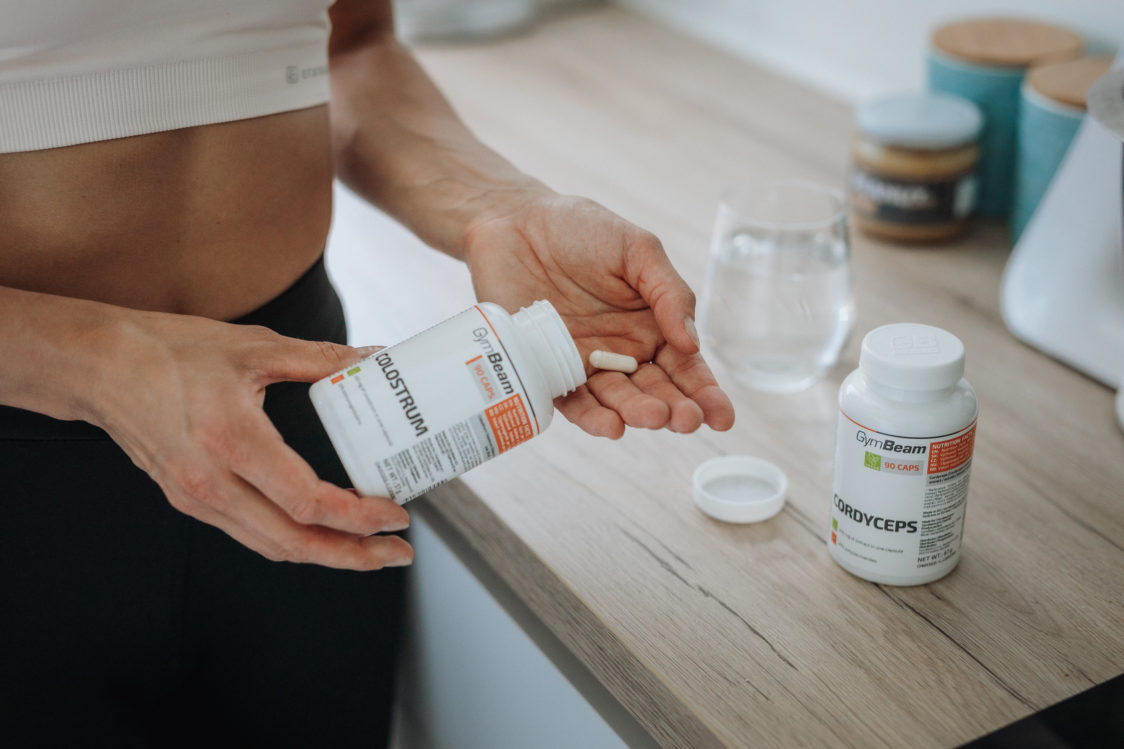Table of Contents
Athletes often use colostrum to increase strength, speed up muscle growth, burn fat, and boost immunity due to its unique nutritional properties, which no other dairy product has. What makes colostrum so special? It contains a high amount of antibodies, growth factors and enzymes that support the growth and defense of the body in the fight against disease. Let’s find out more about colostrum and its real effects on the human body and sports performance.
Why colostrum is considered the most nutritious and healthiest drink in the world
Colostrum is the early milk of mammals, which is formed in the mammary glands just before birth and its production takes only a few days. The composition of colostrum changes during the first days and over time it becomes breast milk. It is an important source of proteins, growth hormones and antibodies necessary for the early development of the newborn offspring.
Colostrum is especially rich in immunoglobulins and other biologically active substances with antimicrobial action, which also contain high-quality whey protein in smaller concentrations. Unlike other dairy products, colostrum is the only one that contains growth factors (especially IGF-1 and IGF-2) that ensure rapid growth and development. Due to its broad positive effects on human health, colostrum is used in the form of food supplements. [1–2]
In most cases, the dietary supplements offer bovine or goat colostrum. Bovine colostrum is very similar in composition to human colostrum, but contains more biologically active substances, especially those with a positive effect on immune functions, such as immunoglobulin IgG. [3–4]
Due to the high content of growth factors such as IGF-1 and IGF-2 (insulin-like growth factors) and proteins with a beneficial effect on the immune system, thanks to immunoglobulins, colostrum is perceived as a supplement to support immune functions, improve sports performance, fight infection and improve the health of the digestive system. [3–4]

Colostrum is extremely nutritious
We have already said that colostrum is far richer in nutrients than regular milk, and even in a small dose you can get a high amount of healthy substances such as vitamin A, E and C, B vitamins or magnesium. However, the magic of colostrum lies elsewhere – in the content of specific health-promoting proteins. [2]
What health-promoting substances can we find in colostrum?
- Proteins – colostrum contains on average about 2.5 times more protein compared to regular milk. Of the total protein content, colostrum boasts 70-80% of immunoglobulins, which is 80 times more than milk. The rest of the protein is covered by whey and casein proteins. [1–2] [5]
- Antibodies are particles of a proteinaceous nature belonging to the group of immunoglobulins, which the immune system uses in the fight against diseases in the form of bacteria and viruses. Antibodies are able to find and neutralize viruses. IgG, IgM and IgA immunoglobulins are most abundant in bovine colostrum. It is IgG from bovine colostrum that can be used to protect the body in the form of passive immunity. Due to its high IgG content, bovine colostrum is also effectively used in the treatment of diarrheal infections. [2] [8]
- Growth factors are substances that stimulate growth, and the hormones IGF-1 and IGF-2 (insulin-like growth factors) are most abundant in bovine colostrum, and can often be found under the name somatomedins. Somatomedins generally stimulate proteosynthesis (the formation of new proteins). [7]
- The antimicrobial peptides lactoperoxidase and lactoferrin, are peptides that the immune system uses to fight infection. Colostrum is the richest source of lactoferrin. [1–2]
- The antibacterial enzyme lysozyme can break down the bacterial cell wall, which can subsequently lead to the destruction of the cell itself. Lysozyme complements the antibacterial properties of lactoferrin. [2] [9–10]
- Proline Rich Polypeptides (PRPs) are also known as colostrinin. They are important regulators of the immune system, support the production of white blood cells and may also be involved in protecting cells against oxidative stress. [26–27]
- Alpha-lactalbumin and Beta-lactoglobulin stimulate the activity of antibody immune cells. [17–18]
Colostrum is loaded with nutrients that have a positive effect on the immune system, the growth of the body and can be beneficial to human health throughout life. Colostrum naturally also contains 2.7–4.6% of carbohydrates in the form of lactose and about 4.4% of fats in the case of fresh colostrum. Dietary supplements usually contain less fat, about 2%. [6]

What health benefits colostrum offers?
Bovine colostrum is a concentrated source of biologically active substances, which supports the immune system and the health of the digestive system. However, does it have any effect on improving sports performance or more efficient muscle growth due to the content of growth factors?
You might be interested in these products:
1. Natural support of the immune system

Proteins, antibodies in the form of immunoglobulins IgG, IgM and IgA, antimicrobial peptides lactoperoxidase and lactoferrin together with the antibacterial enzyme lysozyme are largely responsible for the positive effect of colostrum on the immune system.
Colostrum is also effective to prevent flu and helps reduce it symptoms. One study discovered a threefold reduction in the number of influenza episodes in a group of people taking colostrum compared to the group taking placebo. An Egyptian study, in turn, examined the effect of colostrum supplementation on upper respiratory tract infection. The researchers found that the group of children that was supplemented with bovine colostrum for two months had 37% fewer cases of upper respiratory tract infections compared with the period before supplementation. [11–12]
A 12-week study from New Zealand on 35 endurance runners also confirmed a positive effect of colostrum on immunity. Daily colostrum supplementation increased salivary IgA immunoglobulin levels by 79%. Elevated levels of IgA in saliva can strengthen immune function and help the body to be more effective in fighting upper respiratory tract infections. [13]
Although the results of studies are in many cases very promising, colostrum can still be taken as another piece of the overall mosaic of a comprehensive approach to support the immune system. If you are interested in more tips on strengthening your immune system, read our article 15 Ways to Strengthen Your Immune System and Protect Your Health
2. Protection and part of solving digestive problems
Thanks to lactoferrin, which has antimicrobial activity in the intestines, and other biologically active substances with similar effects, bovine colostrum can also be effective to protect digestive function and as a part of the solution in the treatment of diarrheal diseases. In this case, colostrum should come from cows that have been immunized against E. coli (Escherichia coli), which is the most common cause of bacterial diarrhea. This strategy can also be effective in reducing the risk of traveler’s diarrhea. This fact is also confirmed by a study conducted by researchers from Poland. A group of 30 healthy adults were supplemented with 1,200 mg of colostrum containing antibodies against E.coli (from immunized cattle), and as a result, they had a 90% lower risk of developing traveler’s diarrhea. Colostrum also helps to alleviate diarrhea episodes associated with HIV disease. [14] [28–29] [32]
Bovine colostrum can prevent gastrointestinal damage and digestive problems caused by long-term use of non-steroidal anti-inflammatory drugs such as Ibalgin, Aspirin or Ibuprofen. Their long-term use is mainly associated with musculoskeletal problems. [15–16]
3. Strengthening the integrity of the gastrointestinal wall and improving digestion

It turns out that bovine colostrum can not only effectively fight infection in the intestines, but also strengthen the intestinal wall integrity. This prevents increased intestinal permeability, a condition in which bacteria and toxins are able to pass through the intestinal wall into the bloodstream. And again, lactoferrin, along with growth factors, is responsible for this effect. [19–20]
By strengthening the intestinal wall integrity, colostrum could also alleviate the symptoms of inflammatory bowel disease, as in the case of ulcerative colitis. Research suggests that this could indeed be the case, but more quality and controlled research is needed to confirm this effect. [21]
The amino acid l-glutamine, which is used by some intestinal mucosa cells as an energy source, also has a positive effect on the integrity of the gastrointestinal barrier. Glutamine, like colostrum, strengthens and repairs our inner defensive wall against harmful substances. Glutamine supplementation is recommended at a dose of at least 5 g per day, and more precisely about 0.75 g of glutamine per kilogram of body weight. [22] [33]
Can colostrum improve sports performance and accelerate muscle growth?
Studies on the effect of bovine colostrum on muscle growth have different results. Considering the use of bovine colostrum versus whey protein, the studies did not find a consistently significant difference in the effect on muscle growth. However, a study by Antonio (2001) have found that after 8 weeks of intervention, there was a significant increase in lean muscle mass in the strength training group using colostrum compared to the group using whey protein. [23–25]
The main factors for the growth of muscle mass include a sufficiently large training stimulus, optimal calorie intake with the right ratio of macronutrients, sufficient amount of protein in the diet (1.4-2 g per kilogram of body weight) and micronutrients. If you are interested in instructions on how to properly build your diet and training plan for muscle growth, read our article What to Eat and How to Exercise to Finally Gain Muscle?
Do growth factors contained in colostrum affect muscle growth?
The digestive system of a newborn individual is not yet fully developed, and as a result, the contained growth factors can pass through the gastrointestinal barrier and act in the target cells. The adult’s digestive system breaks down these growth factors using digestive enzymes before they can enter the bloodstream and target tissues. However, growth factors still have a positive effect on the intestinal wall integrity. This will be appreciated by athletes who engage in high-intensity exercise load in a short time, which has a negative impact on the permeability of the gastrointestinal barrier. [9]
In addition to this fact, colostrum supplementation in sports does not seem to be superior to quality whey protein supplementation.

What are the possible disadvantages of colostrum?
Colostrum supplementation appears to be safe. However, people who are allergic to cow’s milk protein should not take colostrum. For some people, the ethical issue of getting beef colostrum can also play an important role.
What is the typical dosage?
- The recommended daily dose of colostrum is around 1.5 grams per day.
- To support sports performance as a replacement for classic whey protein, the dose of colostrum is in the range of 20-60 grams per day. When we take into account the price-performance ratio, we come to the clear conclusion that its use to support sports performance does not make sense to the vast majority of people.
- The dose to support the health of the digestive system is also 20-60 grams per day.
- As a preventive substance and part of the treatment of digestive problems (diarrhea most often caused by E. coli – a common problem of traveler’s diarrhea), a daily dose of colostrum should provide approximately 400-3,500 mg of immunoglobulins. This bovine colostrum should come from cows or goats that have been immunized against E. coli. [29–31]
What should you remember?
Colostrum is the early milk of mammals, which is formed in the mammary glands just before birth and its production takes only a few days. It is rich in antibodies (immunoglobulins), proteins, growth factors and many other biologically active substances that naturally support the immune system.
Its main benefits include support of the body’s defense against bacterial and viral diseases. It also prevents digestive problems and is used as part of their treatment. Bovine colostrum also has a positive effect on strengthening the gastrointestinal barrier. When the gastrointestinal barrier is weakened, bacteria and toxins are able to pass through the intestinal wall into the bloodstream. However, if the gastrointestinal wall functions properly, it would prevent it. These days, bovine colostrum is considered to be a superfood due to its high content of health-promoting substances. Colostrum can also be useful if you are taking long-term pain medications that have a negative effect on the health of the digestive system. We do not have a clear answer regarding sports performance, but colostrum does not appear to be a superior source of protein over quality whey protein.
Do you have experience with colostrum and do you use it? If you liked the article, support it by sharing so that your friends can learn about the effects of colostrum.
[1] Korhonen, H., & Pihlanto, A. – Technological options for the production of health-promoting proteins and peptides derived from milk and colostrum. – – https://doi.org/10.2174/138161207780363112
[2] McGrath, B. A., Fox, P. F., McSweeney, P. L. H., & Kelly, A. L. – Composition and properties of bovine colostrum: A review. – – https://doi.org/10.1007/s13594-015-0258-x
[3] Uruakpa, F. O., Ismond, M. A. H., & Akobundu, E. N. T. – Colostrum and its benefits: A review. Nutrition – – https://doi.org/10.1016/S0271-5317(02)00373-1
[4] Godhia, D. M. L., & Patel, N. – Colostrum – its Composition, Benefits as a Nutraceutical – A Review. – – http://www.foodandnutritionjournal.org/volume1number1/colostrum-its-composition-benefits-as-a-nutraceutical-a-review/
[5] Lund, P., Sangild, P. T., Aunsholt, L., Hartmann, B., Holst, J. J., Mortensen, J., Mortensen, P. B., & Jeppesen, P. B. – Randomised controlled trial of colostrum to improve intestinal function in patients with short bowel syndrome. – – https://doi.org/10.1038/ejcn.2012.93
[6] Gopal, P. K., & Gill, H. S. – Oligosaccharides and glycoconjugates in bovine milk and colostrum. – – https://doi.org/10.1017/s0007114500002270
[7] Velloso, C. P. – Regulation of muscle mass by growth hormone and IGF-I. – – https://doi.org/10.1038/bjp.2008.153
[8] Hurley, W. L., & Theil, P. K. – Perspectives on Immunoglobulins in Colostrum and Milk. – – https://doi.org/10.3390/nu3040442
[9] Shing, C. M., Hunter, D. C., & Stevenson, L. M. – Bovine colostrum supplementation and exercise performance: Potential mechanisms. – – https://doi.org/10.2165/11317860-000000000-00000
[10] Yamauchi, K., Tomita, M., Giehl, T. J., & Ellison, R. T. – Antibacterial activity of lactoferrin and a pepsin-derived lactoferrin peptide fragment. – – https://doi.org/10.1128/IAI.61.2.719-728.1993
[11] Cesarone, M. R., Belcaro, G., Renzo, A. D., Dugall, M., Cacchio, M., Ruffini, I., Pellegrini, L., Boccio, G. D., Fano, F., Ledda, A., Bottari, A., Ricci, A., Stuard, S., & Vinciguerra, G. – Prevention of Influenza Episodes With Colostrum Compared With Vaccination in Healthy and High-Risk Cardiovascular Subjects: The Epidemiologic Study in San Valentino. – – https://doi.org/10.1177/1076029606295957
[12] Saad, K., Abo-Elela, M. G. M., El-Baseer, K. A. A., Ahmed, A. E., Ahmad, F.-A., Tawfeek, M. S. K., El-Houfey, A. A., Aboul_Khair, M. D., Abdel-Salam, A. M., Abo-elgheit, A., Qubaisy, H., Ali, A. M., & Abdel-Mawgoud, E. – Effects of bovine colostrum on recurrent respiratory tract infections and diarrhea in children. – – https://doi.org/10.1097/MD.0000000000004560
[13] Crooks, C. V., Wall, C. R., Cross, M. L., & Rutherfurd-Markwick, K. J. – The effect of bovine colostrum supplementation on salivary IgA in distance runners. – – https://doi.org/10.1123/ijsnem.16.1.47
[14] Boone, J. H., DiPersio, J. R., Tan, M. J., Salstrom, S.-J., Wickham, K. N., Carman, R. J., Totty, H. R., Albert, R. E., & Lyerly, D. M. – Elevated lactoferrin is associated with moderate to severe Clostridium difficile disease, stool toxin, and 027 infection. – – https://doi.org/10.1007/s10096-013-1905-x
[15] Playford, R., Floyd, D., Macdonald, C., Calnan, D., Adenekan, R., Johnson, W., Goodlad, R., & Marchbank, T. – Bovine colostrum is a health food supplement which prevents NSAID induced gut damage. – – https://www.ncbi.nlm.nih.gov/pmc/articles/PMC1727496/
[16] Playford, R. J., MacDonald, C. E., Calnan, D. P., Floyd, D. N., Podas, T., Johnson, W., Wicks, A. C., Bashir, O., & Marchbank, T. – Co-administration of the health food supplement, bovine colostrum, reduces the acute non-steroidal anti-inflammatory drug-induced increase in intestinal permeability. – – https://pubmed.ncbi.nlm.nih.gov/11352778/
[17] Bounous, G., & Kongshavn, P. A. L. – Differential Effect of Dietary Protein Type on the B-Cell and T-Cell Immune Responses in Mice. – – https://doi.org/10.1093/jn/115.11.1403
[18] Jaziri, M., Migliore-Samour, D., Casabianca-Pignède, M. R., Keddad, K., Morgat, J. L., & Jollès, P. –Specific binding sites on human phagocytic blood cells for Gly-Leu-Phe and Val-Glu-Pro-Ile-Pro-Tyr, immunostimulating peptides from human milk proteins. – – https://doi.org/10.1016/0167-4838(92)90085-r
[19] Hałasa, M., Maciejewska, D., Baśkiewicz-Hałasa, M., Machaliński, B., Safranow, K., & Stachowska, E. – Oral Supplementation with Bovine Colostrum Decreases Intestinal Permeability and Stool Concentrations of Zonulin in Athletes. – – https://www.mdpi.com/2072-6643/9/4/370
[20] Blais, A., Fan, C., Voisin, T., Aattouri, N., Dubarry, M., Blachier, F., & Tomé, D. – Effects of lactoferrin on intestinal epithelial cell growth and differentiation: An in vivo and in vitro study. – – https://doi.org/10.1007/s10534-014-9779-7
[21] Filipescu, I. E., Leonardi, L., Menchetti, L., Guelfi, G., Traina, G., Casagrande-Proietti, P., Piro, F., Quattrone, A., Barbato, O., & Brecchia, G. – Preventive effects of bovine colostrum supplementation in TNBS-induced colitis in mice. – – https://doi.org/10.1371/journal.pone.0202929
[22] Rao, R., & Samak, G. – Role of Glutamine in Protection of Intestinal Epithelial Tight Junctions. – – https://doi.org/10.2174/1875044301205010047
[23] Hofman, Z., Smeets, R., Verlaan, G., Lugt, R. v d, & Verstappen, P. A. – The effect of bovine colostrum supplementation on exercise performance in elite field hockey players. – – https://doi.org/10.1123/ijsnem.12.4.461
[24] Brinkworth, G. D., Buckley, J. D., Slavotinek, J. P., & Kurmis, A. P. – Effect of bovine colostrum supplementation on the composition of resistance trained and untrained limbs in healthy young men. – – https://doi.org/10.1007/s00421-003-0944-x
[25] Antonio, J., Sanders, M. S., & Van Gammeren, D. – The effects of bovine colostrum supplementation on body composition and exercise performance in active men and women. – – https://doi.org/10.1016/s0899-9007(00)00552-9
[26] Janusz, M., & Zabłocka, A. – Colostrinin: A proline-rich polypeptide complex of potential therapeutic interest. – – https://pubmed.ncbi.nlm.nih.gov/24200016/
[27] Janusz, M., & Lisowski, J. – Proline-rich polypeptide (PRP)—An immunomodulatory peptide from ovine colostrum. – – https://pubmed.ncbi.nlm.nih.gov/8010865/
[28] Berlutti, F., Pantanella, F., Natalizi, T., Frioni, A., Paesano, R., Polimeni, A., & Valenti, P. – Antiviral properties of lactoferrin—A natural immunity molecule. – – https://doi.org/10.3390/molecules16086992
[29] Otto, W., Najnigier, B., Stelmasiak, T., & Robins-Browne, R. M. – Randomized control trials using a tablet formulation of hyperimmune bovine colostrum to prevent diarrhea caused by enterotoxigenic Escherichia coli in volunteers. – – https://doi.org/10.3109/00365521.2011.574726
[30] Tacket, C. O., Losonsky, G., Link, H., Hoang, Y., Guesry, P., Hilpert, H., & Levine, M. M. – Protection by milk immunoglobulin concentrate against oral challenge with enterotoxigenic Escherichia coli. – – https://doi.org/10.1056/NEJM198805123181904
[31] Kamal Patel – Colostrum - – https://examine.com/supplements/colostrum/#how-to-take
[32] Kaducu, F. O., Okia, S. A., Upenytho, G., Elfstrand, L., & Florén, C.-H. – Effect of bovine colostrum-based food supplement in the treatment of HIV-associated diarrhea in Northern Uganda: A randomized controlled trial. –– https://doi.org/10.1007/s12664-011-0146-0
[33] Kamal Patel – Glutamine – – https://examine.com/supplements/glutamine/#how-to-take


Add a comment